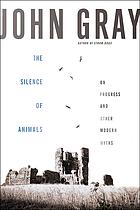
The Silence of Animals
On Progress and Other Modern Myths
- اطلاعات
- نقد و بررسی
- دیدگاه کاربران
نقد و بررسی

April 8, 2013
Gray (Straw Dogs), emeritus professor of European thought at the London School of Economics, carves a winding path through 20th century intellectual history to build an attack on liberal humanism, and questions the assumptions that humans cling to as proof of our inherent goodness and perfectability. Drawing on a history of atrocities, Gray asserts that “civilization is natural for humans, but so is barbarism.” He suggests that modern society’s vehement belief in historical progress comes from the pairing of a Socratic faith in reason with a Christian notion of salvation. To counter these myths, Gray constructs his own pantheon of “thinkers who were not afraid to doubt the worth of thought,” drawing upon philosophers and poets who point to how “life can be lived well without metaphysical comfort.” The result is a constellation of ideas that resist order, salvation, and the primacy of rationalism. Although his vision seems closer to some thinkers than others—he returns repeatedly to Wallace Stevens and spends a great deal of time reenvisioning Freud—Gray describes each of his guiding lights, addressing his or her conceptual limitations before moving on. The result is a work of modern philosophy that is no less readable and compelling for being rigorously bleak. Agent: Tracy Bohan, the Wylie Agency.

April 15, 2013
Another bucket of cold water splashed in the face of idealism by Gray (European Thought/London School of Economics; Black Mass: Apocalyptic Religion and the Death of Utopia, 2007, etc.), this time focused on humankind's stubbornly feral nature. The author opens with series of stories about human atrocity, drawn from both fiction (Koestler, Conrad) and fact (Europe in the world wars), as if to shock readers into recognizing that the notion of human progress is bunk. "There are not two kinds of human being, savage and civilized," he writes. "There is only the human animal, forever at war with itself." It's a persuasive argument, though Gray doesn't attack it with the rigor of a philosopher so much as with the breadth of a well-traveled literary scholar, drawing from John Ashbery and Sigmund Freud as much as Wittgenstein and Nietzsche. He connects the idea that mankind is progressively becoming more civilized with other long-lived religious myths (indeed, he describes it as largely a function of Christianity), but this is not another entry in the "angry atheist" literature, and he's not interested in proofs for or against God. In recognizing that our lives are constructed on fictions, he writes, we acquire a degree of freedom not provided by baseless optimism. He points to the case of British author Llewelyn Powys, gravely ill for much of his adult life, who threw off his sexual and religious shackles and determined to live happily and free of delusions. Gray doesn't bother with the moral complications of such hedonism; he seeks only to demolish moral certainties, not to reckon with their replacements. However cold his perspective, though, the author brings a liveliness to his prose, augmented by the top-shelf authors he quotes. The world is all chaos, Gray wants us to know, but he has a good time delivering the message.
COPYRIGHT(2013) Kirkus Reviews, ALL RIGHTS RESERVED.




دیدگاه کاربران